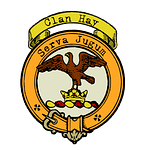Welcome back to "A Clan A Day Podcast" brought to you by bagtownclans.com. I'm your host, Colin MacDonald. Today, we’re diving deep into one of Scotland’s most intriguing and dramatic clan histories: Clan Ruthven. A family with roots that trace back to Norse settlers and whose saga is filled with political intrigue, royal conspiracies, and long-lasting consequences. The Ruthvens were not only powerful Lowland lords but also pivotal players in the power struggles that shaped Scotland’s monarchy. Their tale is one of rebellion, assassination, and eventual redemption, a testament to the turbulent times in which they lived.
The Ruthven name originates from the lands of Ruthven in Perthshire, known in Gaelic as Ruadhainn, meaning "dun uplands." The clan is believed to be of Norse origin, possibly reflecting the Viking invasions and settlements in Scotland. By the late 12th century, the Ruthvens had established themselves in Perthshire, with the earliest notable figure being Swein, who between 1188 and 1199, donated lands to the monks of Scone Abbey. Swein's grandson, Sir Walter Ruthven, was the first to adopt the family name, establishing the clan's legacy in Scotland.
Clan Ruthven's rise to prominence began during the Wars of Scottish Independence. Although initially swearing fealty to Edward I of England, Sir Walter Ruthven later switched allegiance and joined forces with William Wallace in 1297, playing a key role in the siege of Perth. The Ruthvens' loyalty to the Scottish crown was rewarded by Robert the Bruce, who appointed Sir William Ruthven as the sheriff of Perth after the town’s recapture in 1313.
Fast forward to the 16th century, and the Ruthvens had grown in power, with Sir William Ruthven of Balkernoch, a descendant of Sir William, being a significant nobleman. By the time of Patrick, the 3rd Lord Ruthven, the family was heavily involved in the dangerous politics of the Scottish court. In one of the most notorious moments of Ruthven history, Patrick Ruthven played a leading role in the murder of David Rizzio, the Italian secretary of Mary, Queen of Scots, at Holyrood Palace in 1566. This brutal assassination, orchestrated by Lord Darnley, Mary’s husband, would have far-reaching consequences. Ruthven was forced to flee to England, where he died soon after. However, his son, William Ruthven, would inherit the title and return to Scotland with even greater ambitions.
William Ruthven, the 4th Lord Ruthven, was a man who knew how to navigate the shifting sands of power. In 1581, he was created the 1st Earl of Gowrie by James VI and soon became one of the most influential figures in the kingdom. However, his downfall came swiftly. In 1582, Ruthven and several Presbyterian nobles seized James VI in what became known as the Raid of Ruthven, holding the young king captive for nearly a year. The raid was ostensibly carried out to protect the Protestant religion and remove the king's unpopular favorites, but it was, in reality, a bold power grab.
Though the king initially pardoned Ruthven, his enemies were quick to seek revenge. In 1584, Ruthven was arrested for treason, and in a swift and brutal judgment, he was beheaded. His execution marked the beginning of the Ruthven family's downfall, but it wasn't the end of their involvement in royal intrigue.
Just sixteen years later, the Gowrie Conspiracy would cement the Ruthvens’ place in Scottish history as one of the most enigmatic and controversial families. In 1600, John Ruthven, the 3rd Earl of Gowrie, and his brother Alexander were involved in an alleged plot to assassinate James VI. The details of the so-called Gowrie Conspiracy remain shrouded in mystery. The official version, propagated by the crown, claims that the Ruthven brothers attempted to lure the king to their townhouse in Perth to murder him. However, during the alleged assassination attempt, the king was dramatically "rescued," and both Ruthven brothers were killed.
Many historians suspect that the Gowrie Conspiracy was, in fact, a royal plot to eliminate the Ruthvens once and for all, painting them as traitors to justify their destruction. Whatever the truth may be, Parliament swiftly declared the Ruthven brothers traitors, abolished their titles, and stripped the family of their lands. In an almost unheard-of move, the Ruthven name was decreed out of existence in Scotland, and surviving family members were forced to adopt new surnames.
But despite this catastrophic fall from grace, the Ruthven legacy endured. In 1641, the family name was officially restored when the Ruthvens of Balindean were granted permission to assume their ancestral name once again. Another branch of the family, the Ruthvens of Freeland, eventually rose to prominence, and in the 20th century, the family’s honor was finally fully restored.
One of the most remarkable revivals came with Sir Alexander Hore-Ruthven, a descendant of the Ruthvens of Freeland, who was made Governor-General of Australia in the 1930s. For his distinguished service, he was created Lord Gowrie of Canberra in 1934 and later became the Earl of Gowrie in 1945, re-establishing the ancient title that had been lost centuries before.
Today, Clan Ruthven continues to exist, with Patrick Leo Brer Hore-Ruthven, the 3rd Earl of Gowrie, as the current clan chief. Despite their tumultuous history, the Ruthvens have survived as a symbol of resilience, rising from the ashes of disgrace and political downfall to once again hold a place of honor in Scotland.
Thank you for joining us on today’s journey through the riveting history of Clan Ruthven. Be sure to tune in tomorrow for another deep dive into one of Scotland’s fascinating clans. I’m Colin MacDonald, and as always, Go n-éirí an bóthar leat.











